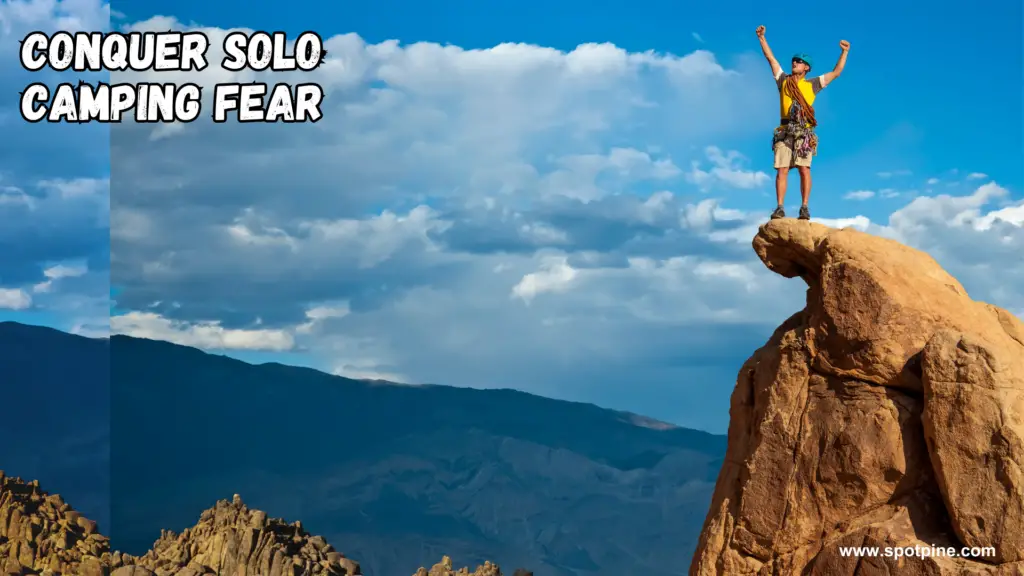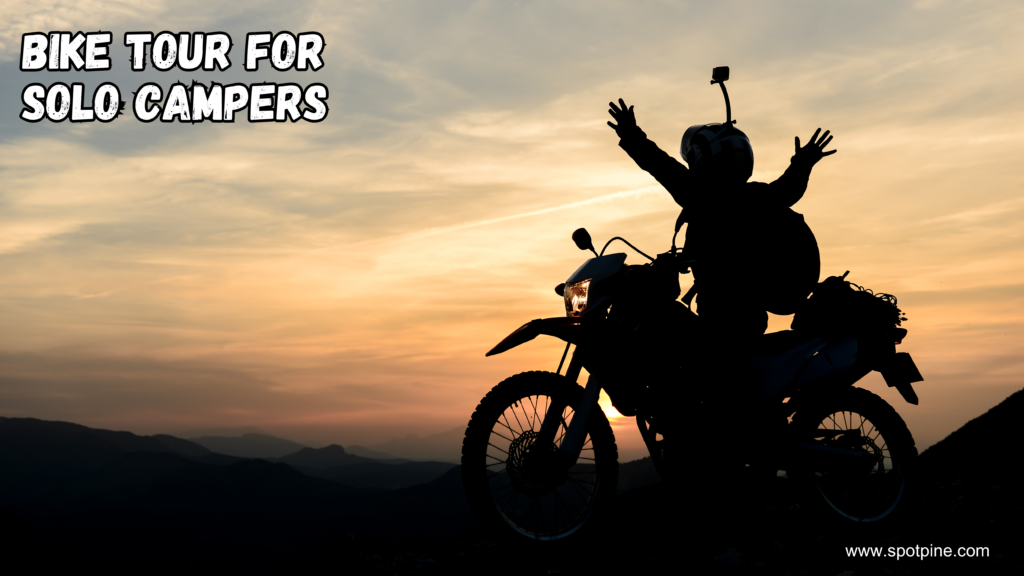To get over the fear of solo camping, start by planning your trip and practicing your camping skills beforehand. Solo camping can be a rewarding and exhilarating experience, but it’s important to be well-prepared and confident in your abilities.
If you’ve always loved camping but have never tried it alone, the idea of solo camping can be intimidating. However, with a little bit of planning and preparation, solo camping can be a great way to relax and unwind while enjoying the great outdoors.
We’ll explore some tips for getting over the fear of solo camping and making your first solo camping trip a success. From selecting the right gear to developing your camping skills and mental toughness, these tips will help you feel confident and prepared, no matter what challenges you may face on your solo camping adventure.
Understanding Solo Camping Fear
Fear is a normal human emotion that arises from a threat to our survival. Understanding the fear associated with solo camping is important, and there are common reasons for it, such as lack of experience, fear of the unknown and potential danger. It is essential to acknowledge that anxiety is a psychological condition and can make our fears and worries seem more intense than they are.
| Common Reasons for Fear: | Psychological Effects of Anxiety: |
| 1. Lack of experience | 1. Can cause panic attacks |
| 2. Fear of the unknown | 2. Can lead to irrational thoughts |
| 3. Potential danger | 3. Can contribute to avoidant behavior |
Overcoming the fear of solo camping requires learning about camping and practicing techniques to manage our anxiety. It is essential to start with small steps, such as camping in familiar places and gradually exposing ourselves to new camping experiences. If necessary, we can seek professional help in managing anxiety and addressing the fear associated with solo camping.
Preparation For Solo Camping
For a successful solo camping trip, it is essential to choose the right camping gear, plan for the trip, and familiarize yourself with the campsite. When selecting camping gear, consider the weather conditions and terrain of the campsite. Make sure you have a sturdy tent, a sleeping bag appropriate for the temperature, and a backpack that can carry all your essentials.
Once you have your gear, plan your trip. Choose a campsite that is suitable for solo camping, and make a list of everything you need to bring. When packing, be sure to pack light and bring only the essentials. Research the area and prepare for any potential risks or hazards.
Finally, familiarize yourself with the campsite before heading out. Look at maps and trailheads, know the regulations, and be aware of any wildlife in the area. You can also try a trial camping in your backyard to get comfortable with camping alone and your gear.
Mental Preparation For Solo Camping
Camping alone can be daunting, but proper mental preparation can help build confidence and overcome fears. Practice is key to conquering any reservations you may have about solo camping. Start by taking short day trips, and gradually work up to spending a night or two alone. Positive self-talk and visualization can also build confidence and calm anxieties. Remind yourself of the reasons you want to go solo camping and the skills you have developed. When anxiety arises, acknowledge and address it with rational thinking. Face and overcome your concerns by practicing camping skills and researching safety procedures. Remember that fear is a natural response, and feeling it should not prevent you from achieving your goals.
Credit: www.amazon.com
Practical Tips For Solo Camping
Solo camping can be a thrilling experience but it can also be anxiety-provoking for some people. With proper preparation and planning, however, you can overcome your fears and enjoy a successful trip. Here are some practical tips to help you:
Follow A Routine
Establishing a routine can help you feel more at ease while camping alone. For instance, wake up and go to bed at the same time each day and plan regular meals and activities. This will help you feel more in control of your situation and reduce any feelings of anxiety or unease.
Stay Organized
Having a well-organized campsite can help you feel more at ease. Make sure your gear is easily accessible and your site is well-maintained. This will help you stay focused on the joy of the experience rather than worrying about losing gear or tripping over clutter.
Focus On The Joys Of The Experience
Take time to appreciate the natural beauty around you. Engage in activities that bring you joy and make you feel grounded, such as hiking or journaling. Focusing on the positive aspects of your experience can help quell any nerves or fears.
Be Aware Of Potential Dangers
It’s important to take safety precautions when camping alone. Be mindful of wildlife and potential hazards in the area, and make sure to have a first-aid kit and emergency plan in place in case of an emergency. Taking proactive measures will help you feel more secure in your solo camping adventure.
Click Here To Know More Solo Camping Tips: Expert Strategies
Overcoming Anxiety At Night
Going on a solo camping trip can be daunting, especially at night. However, there are ways to make yourself feel more comfortable in the wilderness. Firstly, ensure that you have a comfortable sleeping setup, such as a sleeping pad and a warm sleeping bag. This will make it easier for you to fall asleep and stay asleep.
Secondly, choose a safe and suitable campsite. Look for a spot that is relatively flat and away from any hazards, such as loose rocks or branches. Make sure there is enough distance between you and any potential wildlife, and consider setting up camp near other campers if possible.
Lastly, use relaxation techniques to calm your mind and body. This could include deep breathing exercises or listening to calming music. Remember that you are capable of overcoming your fears, and the rewards of solo camping are worth it.
Being Self-sufficient During Solo Camping
When going on a solo camping trip, it’s essential to be self-sufficient in terms of cooking, food storage, finding and purifying water and dealing with emergencies. To ensure you have enough food during your trip, carry non-perishable items, such as granola bars, nuts, and dried fruits. Also, bring a portable camping stove, utensils, and a cooler for perishables.
Water is an essential commodity when solo camping. You need to find a freshwater source and carry a water filtration device or water bottles with filters. This filtration device will ensure that all the water you drink is safe and free of harmful bacteria.
When it comes to dealing with emergencies, being prepared is key. Always carry a first aid kit and survival gear such as a flashlight, whistle, and emergency blanket. In case of a wildlife attack, make sure you have bear spray or anything that can ward off dangerous animals.
Connecting With Nature During Solo Camping
Spending time in nature is a great way to connect with yourself and overcome the fear of solo camping. There are numerous benefits to spending quality time in nature. It helps reduce stress levels, increases creativity, and improves overall mood and mental health. When you’re camping alone, you get the opportunity to truly appreciate and learn from nature. Some ways to do this include observing the wildlife, hiking in the woods, or simply sitting quietly and listening to the sounds of nature. By taking the time to appreciate the natural world around you while solo camping, you’ll find that your fear will dissipate, and you’ll feel more confident in your ability to be on your own.
| Benefits of spending time in nature | Ways to appreciate and learn from nature |
| Reduces stress levels | Observe wildlife |
| Increases creativity | Hike in the woods |
| Improves overall mood and mental health | Sit quietly and listen to the sounds of nature |
Communities And Resources For Solo Campers
For those interested in solo camping, there are various resources available to help get over the fear of camping alone. Online groups and forums can provide a safe space for discussion and asking questions. It is also possible to find solo camping events and meetups that offer the opportunity to connect with other solo campers. Additionally, professional instructors and guides can provide education and training on camping and outdoor survival skills, helping to build confidence in solo camping abilities. By utilizing these communities and resources, solo camping can be an enjoyable and empowering experience.
FAQs:
How Do I Stop Being Scared Of Solo Camping?
To overcome fears of solo camping, start with shorter trips and gradually go longer. Research the area and be prepared with safety supplies. Inform someone of your trip and location. Stay calm and focused, avoid being too isolated and trust your instincts.
How Do I Get Over My Camping Anxiety?
To get over camping anxiety, start small by practicing in your backyard. Gradually increase the distance and length of your trips. Plan ahead and make a checklist to avoid forgetting anything. Bring items that are comforting to you and have a calming effect, such as a favorite book or music.
Finally, remember that it’s okay to take breaks and give yourself time to adjust.
Is Solo Wild Camping Scary?
Solo wild camping can be scary for some people, especially if they are inexperienced or anxious about being alone in the wilderness. However, with proper preparation, research, and equipment, solo camping can be a safe and enjoyable experience for many outdoor enthusiasts.
It’s always important to prioritize safety and follow Leave No Trace principles.
Why Am I So Scared Of Camping?
People may feel scared of camping due to fear of wildlife encounters, unfamiliarity with outdoor environments, or had past negative experiences. This fear is common, but can be overcome with preparation, education, and camping with others.
Conclusion
Overcoming the fear of solo camping is not easy, but it’s rewarding. It allows you to connect with nature and yourself. By following essential safety measures, preparing well, and practicing, you can confidently embark on solo camping trips. Don’t let the fear hold you back.
Believe in yourself, trust your instincts, and enjoy the experience. Happy camping!



